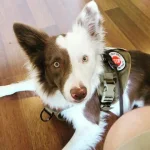- By Ralph Montes
- May 24, 2022 Updated May 24, 2022

Ralph Montes
Bringing awareness to our community in order to prepare, prevent and respond to public health emergencies is my goal.
Service animals in disasters play a critical role and in order to have a better understanding, we first need to know the definition and law.
According to the Americans with Disabilities Act (ADA) service animals are defined as dogs that are individually trained to do work or perform tasks for people with disabilities. Examples are guiding the blind, alerting the deaf, pulling a wheelchair, alerting and protecting a person having a seizure, reminding a person with mental illness to take prescribed medications or calming a person with Post Traumatic Stress Disorder (PTSD). Service animals are working animals and not pets.
Texas Disability Law requires public facilities and common transportation carriers to admit a person with a disability accompanied by a service dog for assistance and to admit a trainer accompanied by a dog for training purposes. The law also requires evacuation, transport and temporary shelter of service animals and it also provides a criminal penalty for those who deny access and provides protection if a service animal is attacked, injured or killed.
The law allows facility owners and staff to ask two questions of service animal owners. First, is the dog a service animal required because of a disability, and second, what work or task has the dog been trained to perform?
Staff cannot ask about the person's disability, require medical documentation, or require them to show proof of service animal certification, or ask that the dog demonstrate its ability to perform the work or task.
Allergies and fear of dogs are not valid reasons for denying access or refusing service. If there is a legitimate reason to remove a service animal, goods or services must be offered in placement of the service animal.
Disaster Preparedness for You and Your Service Animal:
Stay Informed to local and state alerts, television and radio, social media outlets, and wireless emergency alerts.
Making a plan will provide less difficulty, stress, and worry when you need to make a decision.
- Include your address and phone number.
- Include family and friend's emergency contact information.
- Include your veterinarian's contact information.
- If separated, a picture of you and your service animal will help with identification and prove of ownership.
- Share your plan with others.
- Include fresh food and water.
- Two kits, one larger kit for sheltering in place and one smaller kit for evacuation.
- Ensure medicines are not expired.
- Microchip information, ID tag, collar, harness and leash.
- Place copies of your service animal's registration and vaccination records in a waterproof bag and available electronically.
- If traveling, consider a pet carrier or crate.
- Grooming items, such as shampoo, conditioner, towels and brush.
- Sanitation items, such as newspapers, paper towels, plastic trash bags and household chlorine bleach.
- Reduce service animal stress by providing familiar toys, treats or bedding.
- Map out primary and secondary routes in advance. Follow local official's request to evacuate. Do not leave your service animal behind, they may end up lost, injured, or worse.
- Explain to first responders, you and your service animal have the legal right to be evacuated together.
- Shelters should adopt procedures to ensure individuals and service animals are not separated or segregated.
- Shelters cannot deny a service animal, even when staff or volunteers can provide the same support.
- If you stay in a hotel make sure staff are aware you have a service animal.
- For additional information contact your Veterinarian Office, Animal Control Office or Office of Emergency Management. Check websites on Americans with Disabilities Act (ADA), Texas Disability Law, and ADA National Network Checklist-Emergency Supply Kits.

Health Corner: Preparing a disaster plan for you and your service animal
Bringing awareness to our community in order to prepare, prevent and respond to public health emergencies is my goal.










